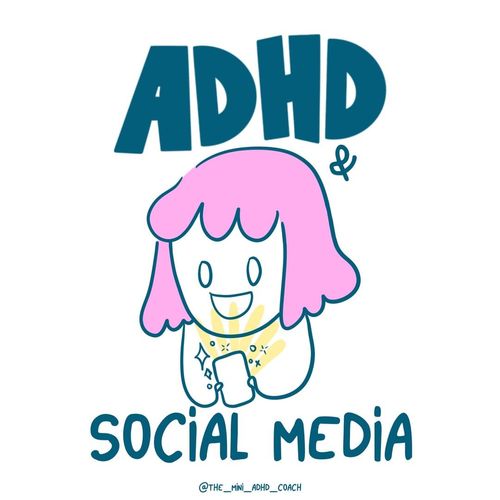The TikTok Effect: Self-Diagnosing ADHD Through Social Media

Table of Contents
The Allure of TikTok for ADHD Information
TikTok's short-form video format has revolutionized information consumption, making complex topics more accessible and relatable. This is particularly true for understanding ADHD.
Accessibility and Relatability
TikTok provides a unique platform for understanding ADHD, particularly for younger generations.
- Easy-to-understand explanations: Many creators break down complex ADHD concepts into digestible, bite-sized pieces.
- Relatable personal experiences: Creators share their struggles and triumphs, fostering a sense of community and reducing feelings of isolation.
- Visual aids: Videos often incorporate visuals, making information easier to process and remember.
Feeling understood and less alone is a significant benefit of connecting with others through shared experiences on TikTok. This increased sense of community can be a powerful tool for those navigating the challenges of ADHD.
The "ADHD Content Creator" Phenomenon
The rise of ADHD content creators on TikTok is a double-edged sword.
- Increased awareness: These creators raise awareness about ADHD and its diverse manifestations.
- Community building: Online communities built around these creators offer support and a sense of belonging.
- Potential for misinformation: The lack of professional oversight can lead to the spread of inaccurate or misleading information about ADHD symptoms, diagnosis, and treatment.
Critical thinking is paramount when consuming content from this space. Always cross-reference information with reputable sources and seek professional guidance.
The Dangers of Self-Diagnosing ADHD on TikTok
While TikTok offers valuable insights into ADHD, relying solely on social media for diagnosis is dangerous.
Misinformation and Inaccurate Information
The ease of content creation on TikTok also facilitates the spread of misinformation.
- Examples of misinformation: Incorrect descriptions of symptoms, unfounded treatment claims, and promotion of unproven methods.
- Lack of professional oversight: Unlike peer-reviewed articles, TikTok videos aren't subject to rigorous fact-checking.
- Potential for self-medication: Misunderstanding ADHD can lead individuals to self-medicate, potentially causing harm.
Misinterpreting symptoms and self-treating can have serious consequences. Accurate diagnosis and treatment require the expertise of a qualified professional.
The Limitations of Online Self-Assessments
Online quizzes and tests are not substitutes for a professional evaluation.
- Lack of comprehensive assessment: These tools often lack the depth and breadth of a proper clinical evaluation.
- Potential for bias: The design and questions of self-assessments can introduce bias, leading to inaccurate results.
- Inability to account for comorbid conditions: Online tests often fail to consider other conditions that may co-occur with ADHD.
A holistic and personalized diagnosis requires a comprehensive assessment by a trained professional.
The Psychological Impact of Self-Diagnosis
Self-diagnosing can have significant negative consequences on mental health.
- Increased stress: Uncertainty about one's condition can lead to heightened anxiety and stress.
- Self-stigma: Misunderstanding ADHD can lead to self-stigma and feelings of inadequacy.
- Delayed professional help-seeking: Relying on self-diagnosis can delay seeking professional help, delaying access to appropriate treatment.
Seeking professional help is crucial for accurate diagnosis and effective treatment.
Seeking Professional Help for ADHD Diagnosis
A formal assessment by a qualified healthcare professional is crucial for accurate diagnosis and effective treatment.
The Importance of a Professional Evaluation
A proper evaluation offers several advantages over self-diagnosis.
- Comprehensive evaluation: Professionals conduct thorough assessments, considering various factors impacting symptoms.
- Accurate diagnosis: This ensures the individual receives the correct diagnosis and appropriate treatment plan.
- Personalized treatment plan: Professionals tailor treatment strategies to the individual's unique needs and circumstances.
Psychiatrists, psychologists, and other qualified healthcare professionals are equipped to diagnose ADHD.
Finding the Right Professional
Finding the right professional can involve several steps.
- Online directories: Use online resources to find professionals specializing in ADHD diagnosis and treatment.
- Referrals from primary care physicians: Your primary care physician may provide referrals to specialists.
- Insurance provider networks: Check your insurance coverage for mental health services and find in-network providers.
Helpful resources include [insert relevant links to reputable ADHD organizations and resources here].
Conclusion
TikTok provides accessible and relatable information about ADHD, fostering a sense of community. However, self-diagnosing ADHD through social media carries significant risks, including misinformation, inaccurate self-assessments, and negative psychological impacts. Relying solely on "self-diagnosing ADHD through social media" is dangerous. A professional evaluation from a qualified healthcare professional is essential for an accurate diagnosis and effective treatment plan. Don't rely solely on social media for ADHD information – seek professional help today!

Featured Posts
-
 Czy Porsche Cayenne Gts Coupe Spelnia Oczekiwania Szczegolowy Test
Apr 29, 2025
Czy Porsche Cayenne Gts Coupe Spelnia Oczekiwania Szczegolowy Test
Apr 29, 2025 -
 Pw Cs African Retreat Exit From Senegal Gabon Madagascar And More
Apr 29, 2025
Pw Cs African Retreat Exit From Senegal Gabon Madagascar And More
Apr 29, 2025 -
 Jeff Goldblum Announces Star Studded Jazz Album
Apr 29, 2025
Jeff Goldblum Announces Star Studded Jazz Album
Apr 29, 2025 -
 Convicted Cardinal Claims Entitlement To Vote For Next Pope
Apr 29, 2025
Convicted Cardinal Claims Entitlement To Vote For Next Pope
Apr 29, 2025 -
 Speedboat Flips During Arizona Boating Competition Record Attempt Video
Apr 29, 2025
Speedboat Flips During Arizona Boating Competition Record Attempt Video
Apr 29, 2025
